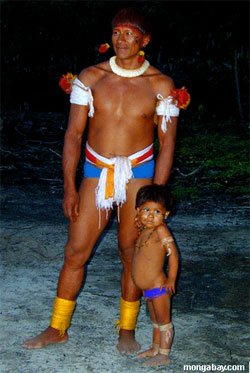Efforts to create an international climate framework — including a carbon financing mechanism for forest conservation — must involve forest people, said indigenous leaders attending the Indigenous Peoples Global Summit on Climate Change meeting this week in Anchorage, Alaska.
Speaking at a press conference organized by The Nature Conservancy in connection with the Summit, Egberto Tabo, General Coordinator of the Coordinating Body of Indigenous Organizations of the Amazon Basin (COICA), said that indigenous knowledge will play a critical role in addressing climate change.
“For thousands of years, indigenous peoples have been the ones conserving the forests,” Tabo said. “Our ancestors talked about climate change. We’ve known for generations that this was going to happen.”
“We are the true conservationists. But our role in conserving the forests has not truly been recognized.”

Indigenous people serve as guardians of forest carbon throughout the Amazon. Research has shown that deforestation rates in indigenous reserves are considerably lower than in unprotected areas. |
Johnson Cerda, a leader of the Quichua community in Ecuador and advisor for Conservation International’s Indigenous and Traditional Peoples Program, agreed that indigenous communities have so far had a limited role in helping shape climate policy.
“Participation is the key element. We cannot only go there as observers. We have knowledge in conservation and based on that knowledge we should participate in these talks.”
Cerda said that reducing emissions from deforestation and degradation (REDD), a proposed mechanism for compensating countries for protecting forests, could be a powerful tool for indigenous communities to protect themselves against climate impacts, but only if the rights of forest people were recognized.
“In REDD, there must be recognition of local and Indigenous knowledge,” Cerda said. “Why under REDD should forests be recognized and not the people have lived there for generations?”
Sarene Marshall, Director of The Nature Conservancy’s Climate Change Program, added that REDD will not work unless indigenous people are part of the development process.
“Reaching an effective climate agreement in Copenhagen this year will require the full and open participation of Indigenous Peoples,” Marshall said. “The benefits of REDD must reach local and Indigenous Peoples. Without those benefits, conservation is not sustainable.”
Joanna Durbin, Director of the Climate, Community and Biodiversity Alliance (CCBA), said her group is working to develop new forest carbon certification guidelines that ensure that benefits from REDD projects reach Indigenous communities.
“We hope world leaders will adopt a policy framework that supports developing countries, forests, local and indigenous people and biodiversity to benefit from global climate change efforts,” she said.
Indigenous claims to forest carbon recently received a boost when the Brazilian Supreme Court reaffirmed the rights of indigenous people to the revenues accrued from the “natural wealth” within their territories. While the decision didn’t explicit cite forest carbon, it suggests carbon credits and payments for environmental services generated from their lands are rightfully due to them. Meanwhile a separate legal analysis by Baker & McKenzie and Forest Trends on behalf of the Surui tribe in the state of Acre concluded that Indians indeed own rights to carbon on their lands under Brazilian law.







